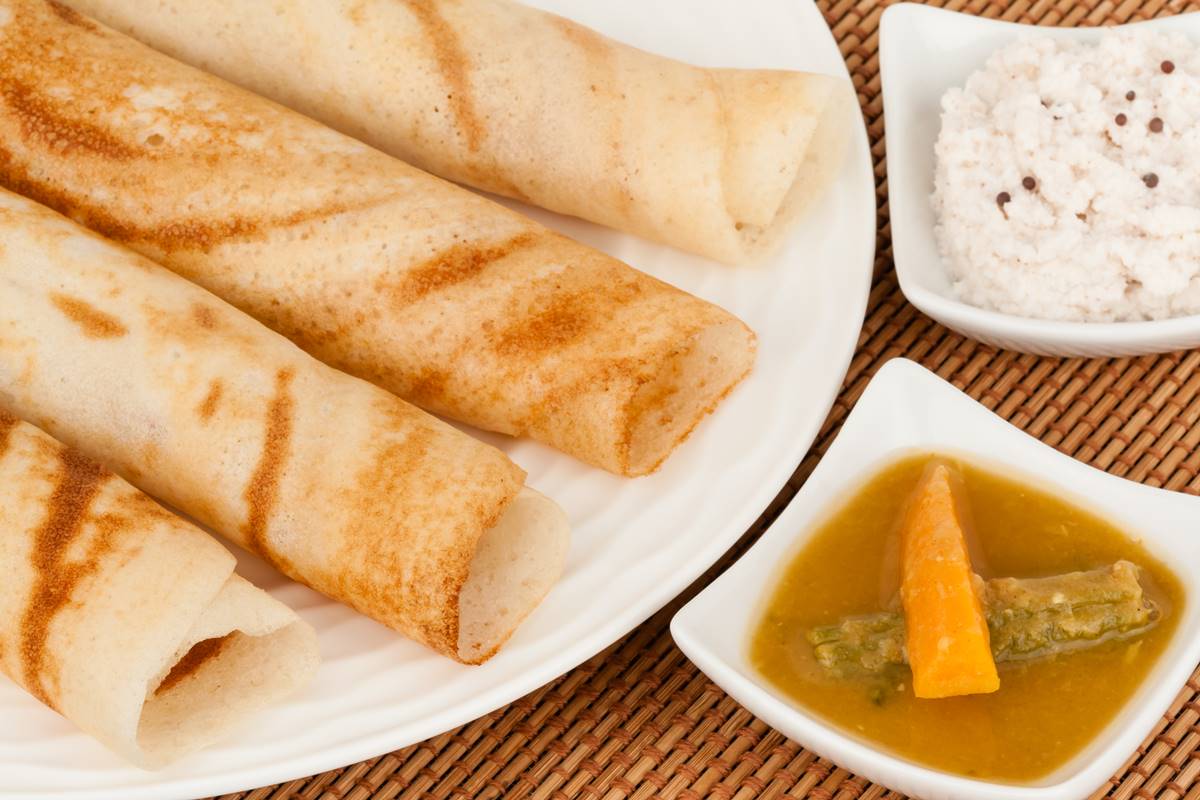South Indian cuisine not just dosas and idlis
South Indian style of cooking is very underrated.
The delightfully light dish is best eaten hot and crisp, when it is fresh off the griddle

(Photo: Getty Images)
Naan, lachcha parathha, poori, tandoori roti and missi roti are delicious, but these North Indian staples are just a fraction of country’s diverse culinary offerings. To get a more complete picture, you also need to head South. South Indian cuisine is vastly different, containing rice, lentils, coconut and vegetables in a big way. Originated in Udupi, dosa and idli rule the popularity charts across the world. A traditional dish made of fermented rice and lentil batter, a dosa is much like a crispy thin crepe, and is had with sambhar and coconut chutney. Read on to know more about the popular dish and learn how to make dosa at home.
Dosa comes in various forms. From the original hollow plain dosa and masala dosa stuffed with a special potato-onion filling, the dish has been given many modern makeover. There is rava dosa made from semolina, and new age variants with fillings such as cheese, cottage cheese, mixed vegetables and even meat. Whatever you choose, the delightful light dish is best eaten hot and crisp, when it is fresh off the griddle.
Advertisement
When it comes to dosa, the key elements involved in making this dish perfect are the appropriate ratio of ingredients and the correct technique of making its batter and cooking it golden-crisp. The golden-brown dosa can be made perfect crisp at home keeping a few things in mind – soaking rice and urad dal separately in the ratio of 3:1. Urad dal should be from fresh stock. Soak them for four to five hours before grinding them. Avoid adding water while grinding. The batter should be a little coarse. Fermentation is key. So, while the batter gets ready in just six hours in summers, it may take 10 to 12 hours and special temperature settings in winters.
Advertisement
The timing to add seasoning and the thickness of the batter also decide the taste and texture of the dosas. And then comes the cooking technique. The griddle or tawa should be in correct temperature. It should be evenly hot, neither too much, nor too less. To check whether the temperature is ideal or not, just sprinkle a little water on it. If the water is absorbed quickly, it is the sign that the tawa is ready. If the tawa is smoking hot, reduce the flame, sprinkle a little water on its surface, rub the wet surface with a clean cloth, and then pour in the batter. After making every dosa, the griddle should be cleaned before the batter is spread for the next dosa. Use a small steel bowl or a ladle to spread the batter, starting from the centre and spreading it out in a circular motion. However, be quick, or the batter will start sticking and won’t spread.
Home-made Dosa recipe
Serves: 6
Preparation time: 60 minutes
Cooking time: 30 minutes
Dosa ingredients
Rice: 3 cups
Urad dal: 1 cup
Fenugreek seed: ¼ tsp
Salt: 1 tbsp
Oil as required
Water as required
Method
Wash rice and dal thoroughly one by one.
Soak rice, dal and fenugreek seeds separately in enough water for four to five hours.
Drain the water and grind them separately to a slightly coarse paste in a grinder, adding very little water if required.
Mix both the batters and fenugreek seeds paste well, whisking properly for about 15 to 20 minutes. If the batter is too thick, you can add water to get the desired consistency, which should be neither too thick, nor too thin — just easily spreadable.
Keep the batter in a closed container — for at least 12 hours in winters and six hours in summers — to ferment. After fermentation, the batter will rise, so there should be enough height of the container so that the batter does not splash out.
After fermentation, whisk the dough again and add salt. Beat to mix the salt.
Heat a flat non-stick pan. Let the temperature be appropriate (as guided above) to perfectly cook the dosas.
Spread a little oil on the non-stick pan if you don’t have the traditional thick iron griddle.
Pour one small bowl of batter in the centre of the hot dosa plate.
Spread it quickly with the help of a steel bowl, starting from the centre in a circular motion.
Put some oil on the edges of the dosa.
When it is crispy and cooked from the bottom, turn it around with the help of a flat spatula.
Let it cook for 20 more seconds.
Fold from both sides and serve crispy hot.
For masala dosa, place the filling in the centre, length-wise, before folding it up. While the filling can be of your choice, the traditional one is made with mashed potatoes, chopped onions, chopped green chillies, salt, turmeric powder and a dash of tamarind sauce.
The golden-brown dosas are an ideal snack for when you want to give your stomach a rest from fiery flavours. It tastes awesome simply with coconut chutney. From breakfast to dinner, this staple of South India has travelled every part of the country and beyond.
Advertisement